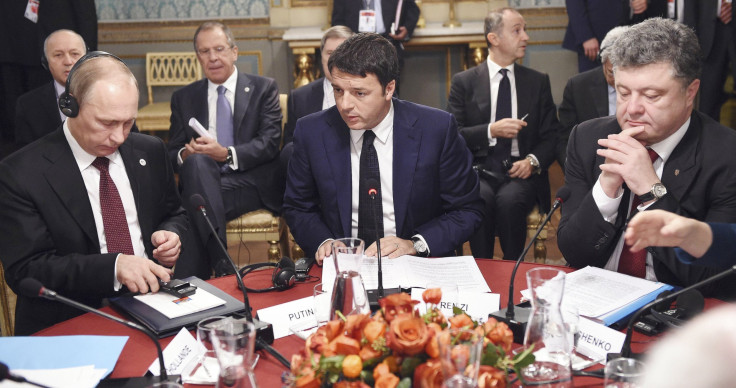No Sign Of Breakthrough As Russia, Ukraine Meet In Milan

(Reuters) - Russian President Vladimir Putin and Ukrainian leader Petro Poroshenko met an array of EU leaders on Friday, but there was little sign of progress in patching up a ceasefire in eastern Ukraine and resolving a dispute over gas supplies.
Putin held more than 2-1/2 hours of talks with German Chancellor Angela Merkel overnight. The Kremlin said afterwards the pair were still at odds over how to resolve a crisis that has revived the specter of old Cold War rivalries.
"The two leaders continued to express serious differences in views on the source of Ukraine’s domestic conflict, as well as root causes for what is happening there today," the Kremlin said in a statement.
The West has imposed sanctions on Russia for its annexation of Crimea earlier this year and its support of pro-Russian separatists fighting in the east of Ukraine.
European leaders in Milan for a EU-Asia summit, urged Russia to do more to end constant, deadly violations of a ceasefire that was agreed by Putin and Poroshenko last month in Minsk.
"It is obviously above all Russia's task to make clear that the Minsk plan is adhered to," Merkel told reporters on Thursday. "Unfortunately, there are still a lot of shortcomings but it will be important to look for a dialogue here."
Europe fears Russia's decision to cut gas supplies to Ukraine because of unpaid bills could threaten disruptions in the gas flow to the rest of the continent this winter and is working hard to broker a deal.
Russia is Europe's biggest gas supplier, meeting around a third of demand, and the European Union gets about half of the Russian gas it uses via Ukraine.
The stand-off over pricing is the third in a decade between Moscow and Kiev, though this time tensions are higher because of the fighting in eastern Ukraine.
"HOPEFUL"
Kiev and its Western backers accuse Moscow of aiding a pro-Russian separatist revolt in eastern Ukraine by providing troops and arms. Russia denies the charges but says it has a right to defend the interests of the region's Russian-speaking majority.
Taking the lead in the Milan diplomacy, Merkel saw Poroshenko on Thursday evening. "The meeting went very well and we have seen a great demonstration of support for Ukraine," the Ukrainian president told reporters afterwards.
The German leader then met Putin until well after midnight. Speaking off the record, a German official said the pair had discussed implementation of the Minsk accord, telling Putin that Russia had to meet its commitments to enable a de-escalation.
Italian radio said that afterwards, Putin attended a party thrown by his friend -- the former Italian Prime Minister Silvio Berlusconi. He didn't leave until after 3.00 a.m. (9 p.m. EDT on Thursday) but looked sprightly as he arrived for Friday's talks at 8.00 am.
Putin warned on Thursday that Russia will reduce gas supplies to Europe if Ukraine steals from the transit pipeline to cover its own needs, although he added that he was "hopeful" it would not come to that.
"I can reassure you that there will be no crisis that could be blamed on Russian participants in energy cooperation," Putin told reporters during a visit to Serbia. But, he said, "there are big transit risks."
Germany is Europe's biggest buyer of Russian gas, paying Russian exporter Gazprom around $15 billion a year. EU members such as Bulgaria and Slovakia are almost entirely reliant on Russian gas imported via Ukraine.
Vygaudas Usackas, the EU's ambassador to Russia, said earlier this week there were "positive signs" that a deal might be within reach.
"It seems like we are entering a more promising and positive chapter of the whole puzzle about the crisis in and around Ukraine," he told Reuters.
However, it was not clear how much progress might be made in finding a lasting answer to the eastern Ukraine conflict.
More than 3,600 people have died in the area since fighting broke out in mid-April when armed separatists declared they were setting up their own state.
Although Putin announced this week that Russian troops near the border with Ukraine would be pulled back, Western officials want to see clear evidence that Moscow is acting on this.
Italian Prime Minister Matteo Renzi hosted Friday's meeting, which was also attended by Merkel, French President Francois Hollande and British Prime Minister David Cameron as well as Herman Van Rompuy, the chairman of European Union leaders.
© Copyright IBTimes 2024. All rights reserved.





















